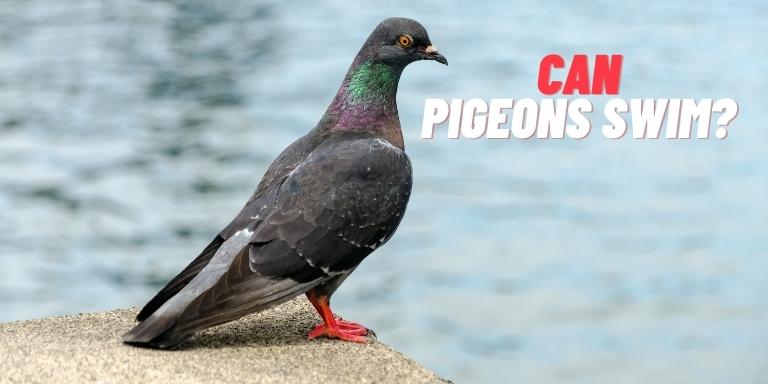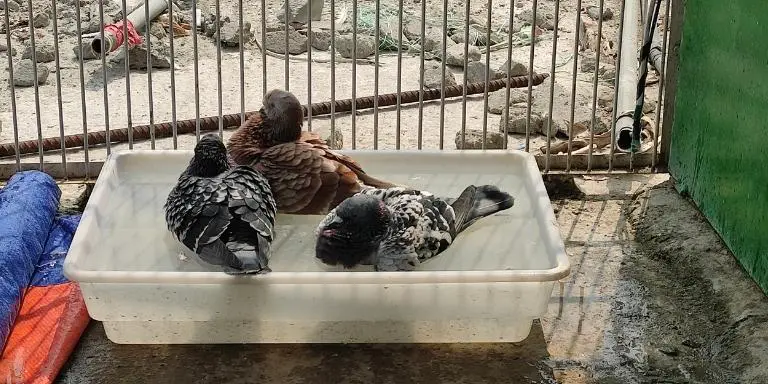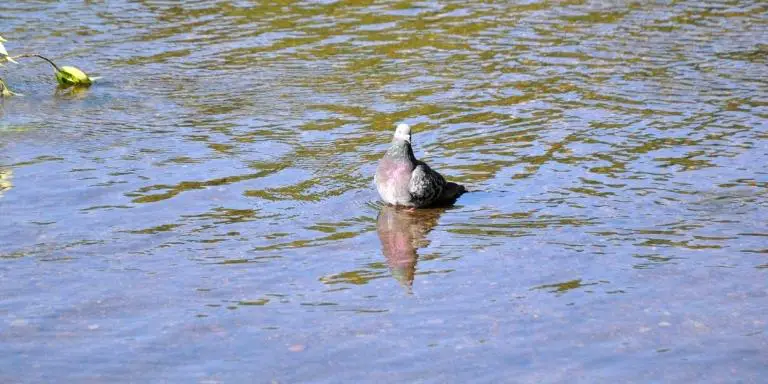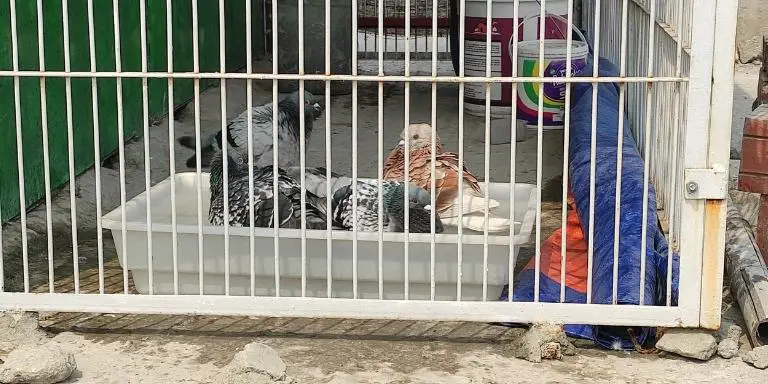Pigeons can not swim. But it does not make them any afraid of water! They might fly miles to find streams and springs, be it for quenching thirst, bathing, or cleaning their feathers.

Do pigeons like water?
Pigeons love water! These aqua-enthusiastic birds are frequently seen near ponds, walls, rivers, swimming pools, and lakes. Notice, not near seas because the water is salty and not drinkable. Also, bathing is fun for them because they thrive on staying clean and smell-free.

They will sit hours beside the water, play around and sprinkle a few water droplets here and there. Watch how these city pigeons amuse themselves and pedestrians near the fountain.
The Reasons behind Pigeons not being able to swim
There are two reasons why a pigeon can’t swim-
- Body structure: Pigeons can’t swim because of their body structure. They have a short body with a stubby neck. Unlike ducks & swans, they do not have webbed feet (the layer that connects the finger) and toes, unlike ducks & swans. It is the reason it is impossible to swim for pigeons.
- No water repellent layer: all aquatic birds have a water repellent layer that keeps their feathers and bodies dry. As a result, they can float as long as they are not exhausted.
Can Pigeons Float?

Just because pigeons can’t swim, it doesn’t mean they can’t float! They do float for a short time. During float span, pigeons open their wings wide and broaden their tail. It provides them with increased surface area and gives them better buoyancy.
But not for too long as dampened feathers increase their weight and eventually struggle to float.
Can a pigeon be drowned?
Being extremely clean-natured, Pigeons get excited on the water. Therefore, after landing on water, they move around their feathers. When feathers get hefty due to dripping water, it causes pigeons to drown. Young pigeons can’t float, so they get drowned. However, adult pigeons may come out of the water with great difficulty.
Can pigeons fly when they are wet?
Pigeons can fly when they are wet but not very well. Most birds can fly in the rain. Pigeons are no different. However, their wings may become saturated with water in the pouring rain. As a result, it makes them difficult to fly and vulnerable to predators.
What Happens if a Pigeon Falls on the Water
If a pigeon accidentally falls on water, it can not fly away instantly. Pigeon bodies aren’t made of lipid and other greasy materials, preventing a body from absorbing wetness.
Aqua birds such as Big Gull, Pelican, Albatross, etc., have these materials. Pigeons lacking those water-repellent oils in their body become waterlogged. Sadly, they will float for some time, then flounder and drown.
Pigeons and Water
You might be wondering if pigeons can’t swim, why are they not afraid of water? Pigeons are intelligent, and they use a tactic for their love of water! And the tactic is – submerging half of their feathers instead of entirely drowning them. Wetting half of their feathers do not make them waterlogged. Hence, pigeons can have control over their floating and enjoy themselves!
Precautions
According to The Centre for Diseases Control studies, if a pigeon or any bird is found dead in the pool, it’s necessary to disinfect the pool. Wild creatures might carry infectious diseases. Cleaning and sterilizing the water are advised to prevent any harm to swimmers.
Watch out for your pigeons
Many birds are natural swimmers; many are not. Unfortunately, pigeons can’t swim to survive. If you own pigeons, try to keep an eye on them also.

Suppose you want to let out pigeons for happy bath times; no need to worry! Make them small pools, ensuring a short height.
Conclusion
Pigeons can’t swim, but they do not die in water either. Keeping your pet pigeons away from water is not a wise decision, as it might create a sense of water phobia in their head. They should be let out to the water overcoming the fear and enjoying their time of life!
Read More: